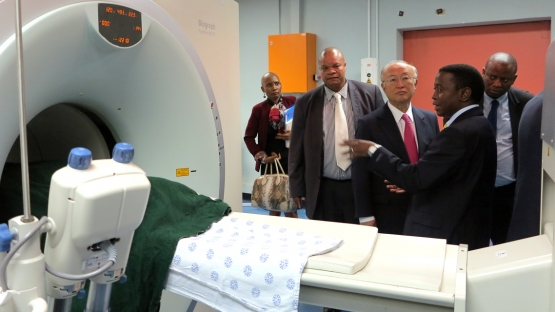Improved cancer care and strengthened research and development capabilities are among the main results of South Africa’s collaboration with the IAEA over the last decades, IAEA Director General Yukiya Amano said at the Steve Biko Academic Hospital in Pretoria. The IAEA’s support has also helped the country to expand its role in sharing cancer care knowledge in the region, and to establish an accelerator mass spectrometry facility, which has elevated South Africa’s position in global biomedical research.
“South Africa’s use of nuclear science and technology in cancer care is a good example of how a country can use this modern technology effectively to improve people’s lives,” Mr Amano said. “I also commend South Africa for using its capabilities to help mentor neighbouring countries on using these tools for cancer and health care and to further research and development.”
Advancing health care for patients and professionals
The Director General toured the Steve Biko Academic Hospital, one of South Africa’s key facilities for providing advanced health care for patients and offering research and training to professionals in the region.
With IAEA support, the hospital has developed its health care and training capacities, including by integrating computed tomography (CT) and positron emission tomography (PET) into its nuclear medicine clinical practice. It is taking part in an IAEA project to establish a national preclinical imaging facility, which provides the capability to create visualizations of living animals for research and development purposes, such as developing new drugs. A future project will further strengthen clinical capacity in PET in South Africa, including the introduction of new radiopharmaceuticals — key drugs used in nuclear and radiation medicine — in clinical practice.
Mr Amano thanked South Africa during his visit to the hospital for its important part in the IAEA’s Virtual University for Cancer Control (VUCCnet) project. South Africa has supported the design and deployment of training courses and modules for the VUCCnet web portal. The VUCCnet assists countries in Eastern Africa in enhancing training capacities of health sector personnel involved in early cancer detection, treatment and palliative care.
“South Africa has been a role model in Africa in cancer treatment and sharing cancer expertise with other countries,” said Mr Amano. “This is helping to bring important, life-saving treatment to patients who have had no access to it until now.”
The first Accelerator Mass Spectrometry facility in Africa
Mr Amano also visited the iThemba Laboratory for Accelerator-based Sciences in Gauteng, which is home to South Africa’s new accelerator mass spectrometry facility — the first in Africa. The facility puts South Africa among the world leaders in accelerator-based research, he said. The accelerator was established in July 2014 with assistance from the IAEA technical cooperation programme and will be used for research in biomedicine, archaeology and paleo-sciences, as well as for postgraduate training.
In an earlier speech marking the 50th anniversary of South Africa’s Safari-1 research reactor, Mr Amano said: “I pay tribute to South Africa’s success, for more than half a century, in using nuclear science and technology effectively to improve the health, well-being and prosperity of its people.”
South Africa’s use of nuclear science and technology in cancer care is a good example of how a country can use this modern technology effectively to improve people’s lives.



